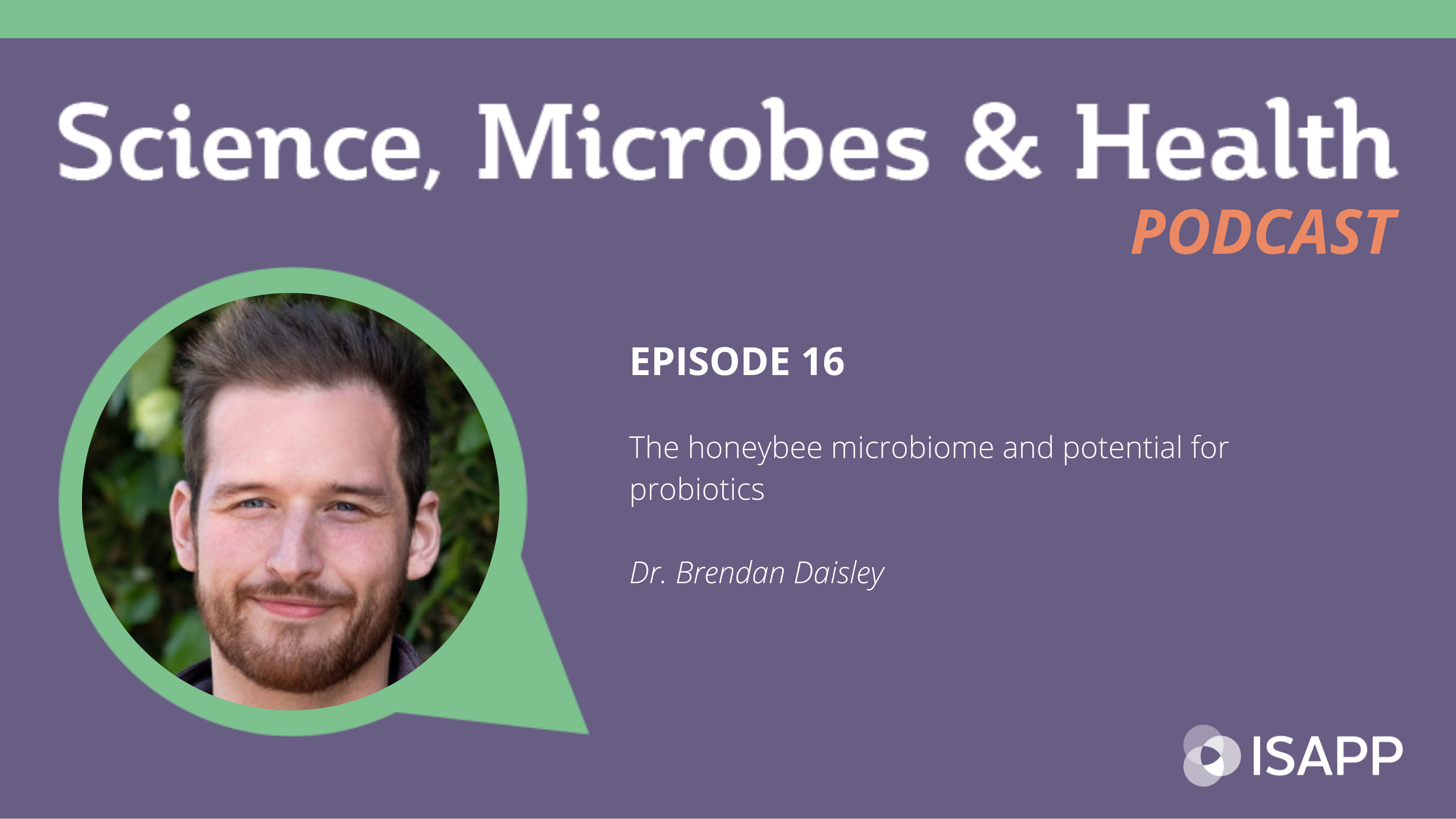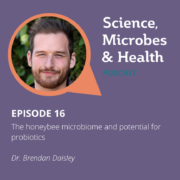Episode 16: The honey bee microbiome and potential for probiotics

Podcast: Play in new window | Download
Subscribe: Apple Podcasts | Spotify | RSS
The Science, Microbes & Health Podcast
This podcast covers emerging topics and challenges in the science of probiotics, prebiotics, synbiotics, postbiotics and fermented foods. This is the podcast of The International Scientific Association for Probiotics and Prebiotics (ISAPP), a nonprofit scientific organization dedicated to advancing the science of these fields.
The honeybee microbiome and potential for probiotics, with Dr. Brendan Daisley
Episode summary:
In this episode, the ISAPP podcast hosts cover the honey bee microbiome with Brendan Daisley, PhD, who is currently a post-doctoral fellow at the University of Guelph in Canada. Daisley explains how the honeybee microbiome is unique, why it’s important for bee health, and the potential for probiotic applications as well as the practicalities of how live microorganisms are delivered to hives.
Key topics from this episode:
- Daisley’s research is motivated by declining bee populations and finding ways to find ways to stop this.
- He originally researched how probiotics could have detoxification functions in humans; this led to the question of whether probiotics could help reduce the toxicity of pesticides in bees and possibly affect resistance to infectious diseases.
- Each individual bee has a microbiome of its own. Unlike other insects, bees have a core, defined microbial community in their guts.
- Surprisingly, no one has successfully derived a completely germ-free honey bee. Microbiota-depleted bees do exist, however.
- Research is ongoing on how microbes may even enable life in bee species — e.g. the recent finding that pupation in stingless bees is triggered by fungi.
- Bees are affected by pesticides; many pesticides also have antimicrobial effects, but regulatory agencies do not track these effects.
- Supplementing bees with beneficial strains of microbes can improve bee health and resistance to infectious diseases. However, no good baseline studies have been done on the bee gut, so it’s difficult to know what’s ‘normal’ and what is missing. The Canadian Bee Gut Project aims to determine this.
- It’s possible to try finding bees that may have had less exposure to pesticides, but it’s difficult to determine past exposure because bees are traded and sent all over the world.
- Wolbachia is a valuable endosymbiont for bees, and acts like a ‘secondary mitochondria’ in their cells. Currently it is hardly ever found in honey bees, possibly because of chronic exposure to tetracycline.
- Probiotics can be delivered to bees using a “BioPatty” or a spray-based formula; the delivery method is very important. Supplementing the hive with certain probiotics can suppress outbreaks of American Foulbrood disease when they happen.
- Daisley and colleagues used 3 probiotic strains, which remain present in the bee host for several weeks.
- As far as potential prebiotics for bees, it has been observed that pollen fibers can beneficially modulate the honey bee microbiome.
- The healthy honey bee microbiome should be dominated by lactic acid bacteria.
Episode abbreviations and links:
- This is the first paper on American foulbrood (AFB), caused by the spore-forming bacterium Paenibacillus larvae, that Daisley and colleagues captured: Novel probiotic approach to counter Paenibacillus larvae infection in honey bees
- In this paper, the group showed LX3 supplementation in the BioPatty formula can decrease AFB load to near undetectable levels: Lactobacillus spp. attenuate antibiotic-induced immune and microbiota dysregulation in honey bees. This paper showed the LX3 strains can mitigate some of the negative health side effects of antibiotic exposure. Another paper from the California study, directly comparing the BioPatty and the new BioSpray, is in press.
- See these reviews related to the honey bee microbiome: Missing microbes in bees: how systematic depletion of key symbionts erodes immunity, and Deteriorating microbiomes in agriculture – the unintended effects of pesticides on microbial life
- Check out the website for the Canadian Bee Gut Project. The project aims to define what constitutes a “healthy” microbiome in honey bees by performing country-wide sampling in coordination with beekeepers across Canada.
About Dr. Brendan Daisley:
Dr. Brendan Daisley is a postdoc at the University of Guelph (Allen-Vercoe lab) and the current President of the Students and Fellows Association of ISAPP. He graduated from his PhD in Microbiology & Immunology at Western University in 2021 (supervisor: Dr. Gregor Reid), during which he received several national awards including the Armand Frappier Outstanding Student Award, adjudicated by The Canadian Society of Microbiologists. Brendan has a broad range of experience in environmental application of probiotics to honey bees and, notably, he was the first to introduce the theory of ‘missing microbes’ within the field of honey bee microbiome research. During his PhD, he helped coordinate several large field trials across North America (mostly in Ontario and California) showing that supplementation of probiotic lactobacilli strains to honey bees could improve colony-level health outcomes. During his postdoc work, he has developed a microbiome database tool (BEExact) for improved detection of uncultivated ‘microbial dark matter’, established a bioreactor model of the honey bee gut microbiome (the RoBEEgut), and co-founded the Canadian Bee Gut Project (https://beegutproject.uoguelph.ca) – a nationwide crowdsourcing initiative that aims to deeply sequence thousands of bee microbiome samples to increase our knowledge on the multifactorial drivers of honey bee mortality.





